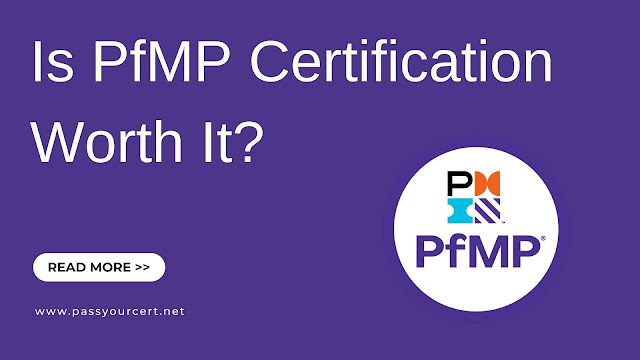Advanced Your Skills with PfMP Certification
Companies make it a point to guarantee that the following goods or services are provided to customers by each of their many divisions. Different operations are being carried out by these divisions, such as managing projects or programs, creating new strategies, and developing best practices.
One of the few things portfolio management does is make sure that these components are executed right away.
One of the best ways to carry out strategic initiatives is through portfolio management since it ties strategy and execution together to create a framework or standard. More ROIs from strategic implementation and tasks were achieved by organizations with effective portfolio management than by those without it.
Portfolio managers are in charge of these tasks, ensuring that plans and objectives are in line with how the projects and programs are run as a whole. A Portfolio Management Professional (PfMP) certification is earned by some portfolio managers to demonstrate their superior talents in juggling and managing many portfolios simultaneously.
This article goes through the basics of PfMP certification as well as a general description of the application procedure.
What is PfMP Certification
One of the most well-liked PMI certifications now in demand across all industries is the PfMP® certification. And obtaining one is difficult. Right now, preparation is your best weapon for the qualification process and the exam. For executives or senior practitioners managing project and programme portfolios that are in line with the organization's strategy, the PfMP® certification is perfect. At least eight years of company experience is one of the qualifications. A high school diploma to an associate's or bachelor's degree can be attained in terms of education. 10.500 hours of PfMP® experience are required for a high school diploma, and 6,000 hours are required for bachelor's degree recipients.
Before taking the PfMP® exam, a panel will review you; they will evaluate your professional experiences and skills and determine whether you are qualified to take the PfMP® certification exam. This also enables the panel to pinpoint the essential elements and prerequisites for exam eligibility. The application, format, and particular conditions of PfMP® certification are covered in the following section.
What is PfMP® Certification and the Process Outline
What then is PfMP® Certification when we discuss the procedures? You must keep in mind that the application period has a specific time limit and that each second counts.
The Portfolio Management Professional Certification procedure timetable is provided below:
- 90 days are allotted to you to finish and submit the prerequisites for the PfMP® certification exam.
- Review - After successfully submitting your credentials, a panel will assess your knowledge of portfolio management as well as your technical aptitude.
- Payment - Before you may reserve a spot on the exam schedule, you must pay the requisite cost.
- Only takes place if your application is chosen for an audit. If so, you have 90 days to prepare the necessary paperwork.
- Panel Review: maximum of four week
- Exam Retake (if you failed the test) - prior to the day you pass the panel evaluation, a year. Within that year, you are permitted to retake the exam three times.
- Those who have already passed the panel review and the exam are eligible for the next PfMP® certification timeframe. As previously said, your certification doesn't end once you've earned your PfMP® certification.
- Up to three years of maintenance Within the three-year period, you must acquire 60 professional development units (PDUs).
- Renewal - This is only accessible once you have acquired 60 PDUs and paid the renewal fee.
- Suspension: This occurs three years after taking the PfMP® exam. Your certification was suspended because you didn't submit the necessary paperwork for renewal and maintenance of your ongoing certification.
- Expiration - The same as previously described. To renew your credentials after they expire, you must reapply.
The PfMP Certification Application
You complete out the application and send it in with your academic qualifications. It is crucial to keep track of your professional experiences in the area of portfolio management so you can show the panel that you have completed these responsibilities. You'll fill out a lengthy form describing your portfolio management experiences. Make sure you have all the details covered because providing ambiguous information will probably get you kicked out. You can list your client's details as your contact if you are self-employed or a senior manager.
You must provide the following information in your PfMP® certification application:
Number of Months of Portfolio Management Experience
The beginning and end dates of your portfolio management experience are used to compile your experiences. To satisfy the eight years of experience requirement, you must provide documentation of 48 to 84 months of portfolio management.
Hours of Portfolio Management Experience
In five portfolio management divisions, the application will ask you to track the number of hours you spent on each assignment. Keep in mind that the needed hours must match your level of study.
A Synopsis of Your Portfolio Management Background
As previously indicated, you must provide thorough details when describing your portfolio management experiences. Only use 500 words at most, and be sure they are well-written.
Here are more tips and tricks:
- Make sure to spell everything correctly and use suitable language.
- Use a word processing program or grammar checker if you are concerned about your grammar and other syntactic concerns.
- When acknowledging each element of your chosen selections, be precise.
- The panel reviewers' eyes are on the experiences. Once they begin asking questions, you don't have to repeat their answers.
Regarding panel inquiries, be sure you have the answers to the following guiding questions:
- How do you implement and used the portfolio management components?
- How and why these components are used.
- The outcomes of these applications.


Comments
Post a Comment